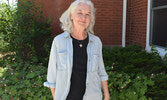Blyth Festival 2024: Caroline Gillis has two major roles to play this season
BY SCOTT STEPHENSON
Actor Caroline Gillis is pulling double duty in a major way for the Blyth Festival’s 50th anniversary season. The versatile actor has graced the stage at Memorial Hall a number of times over the past two decades, and this year, she’s celebrating Blyth in style by taking on the lead roles in two very different plays.
In the first half of the season, you’ll be able to catch Gillis as “Orillia” in Gil Garratt’s Elvis-infused comedy about a modern Huron County family struggling to keep it together. Orillia is a wife, mother and die-hard Elvis fan whose annual trip with her husband to the Collingwood Elvis Festival has to be put on hold while they search for their missing daughter, who struggles with opioid use.
In the second half of the season, Gillis will be taking on the titular role in The Trials of Maggie Pollock by Beverley Cooper. The play is a dramatic interpretation of Canada’s last witch trial, which happened in Goderich in 1919. As Pollock, Gillis will be bringing life to the nearly forgotten woman at the centre of a dark chapter in our nation’s history.
This isn’t the first time Gillis has played two roles in one season - in 2019, she was part of the ensemble for the lighthearted Cake Walk, and then moved on to In The Wake of Wettlaufer - a grim drama addressing the impact of a notorious Canadian serial killer. The quick transition from one character to the next in the middle of the Festival season is a real test of an actor’s chops, and it’s one of which Gillis has proven she’s capable.
So, how is Gillis feeling about spending her whole summer in Blyth bringing these two complicated women to life? “I feel honoured and proud! I have such affection for this Festival, and I can’t believe it’s been around for 50 years! I’m proud to become a little part of the fabric of its history... it’s survived because it does original Canadian plays, and because it recognizes the people of Huron County and the surrounding area. I think it’s important to have a voice in rural Ontario.”
For her, the joy isn’t just the quality of the talent she encounters every time she comes to town - it’s the quality of the people. “They hire really good humans here. It feels almost familial - I’ve been here six or seven times over the last 20 years. It feels a bit like a home… I’ve never had a bad company here, or bad company in Blyth.”
Every season of the Festival brings creative people to town, some coming for the first time, some returning for the 20th time. Gillis loves that the intimate rural setting means it’s not uncommon to have surprise reunions with someone she knows. “I love coming back and working with someone I worked with before. That’s the interesting thing about theatre - Things interlace, and you find yourself working with someone you haven’t worked with for 20 years.” For Saving Graceland, Gillis is excited to work with a play by Gil Garratt, whom she’d first encountered in Toronto when he was just starting out as an actor. Then she learned she’d be playing opposite an old friend. “I was really happy to hear that J.D. Nicholsen was playing my husband, because we’ve known each other through the theatre scene since we were in our early 20s... we haven’t worked together a lot, it’s just nice at our age to be playing husband and wife.”
Beyond the professional side of the stage, Gillis also loves the way Blyth Festival audiences make her feel. “They’re so supportive - there’s a vibe you can feel, that they want it to be good. A rural audience is more open to saying ‘hey, I’m excited! This is going to be a good play!’ In Toronto, they’re more just sitting back and saying ‘OK let’s see what you’ve got….’”
Gillis is currently preparing to become the light-hearted Orillia in mid-June, but she’s still very excited about taking on Cooper’s meticulously researched depiction of the persecuted Maggie Pollock at the end of July. Making the transition between the two could be a daunting task, but Gillis isn’t concerned - she believes that just being in the town of Blyth is the key to handling the big switch with ease. “The great thing about doing rural theatre in this small town is that I don’t have the same focuses I have in Toronto. It feels like there’s always responsibilities there - here, I have a little apartment and I have to just let everything go. It really helps with making the transition. If you just allow yourself to be in Blyth, you can truly give yourself to the play. The transition feels easier to do in Blyth than anywhere, because you were given the opportunity to just focus on the play. Or at least I am. I don’t know about other people and their responsibilities, but I’m letting all of mine go!”


